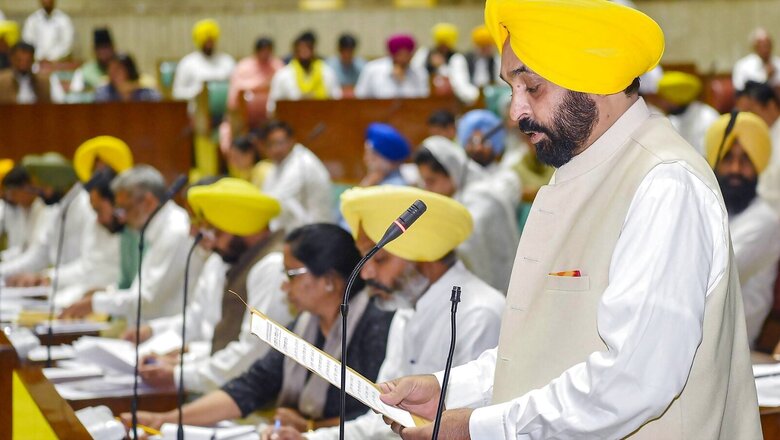
views
The situation on the employment front is grim in Punjab. Rising cases of joblessness in the state are associated with poorer mental health, and increasing instances of crime and substance abuse. There is enough evidence linking drug abuse and deteriorating law and order situation with unemployment, especially in rural areas. Punjab has an overall unemployment rate pegged at 7.3 percent, against the all-India average of 4.8 percent. As per the Centre for Monitoring Indian Economy (CMIE), the average unemployment rate in Punjab between 2017 and 2021 stood at 8.5 percent, which was higher than the national average of 6.2 percent in the age group between 15 and 59 years.
There is a huge exodus of unemployed youths and others from Punjab to overseas in hope of better opportunities, but most of them struggle there too due to lack of training. Their foreign dreams, however, force the poor and hapless parents to sell their small agricultural land.
The Aam Aadmi Party government came to power in Punjab three months back on the promise to provide greater employment opportunities for the youth and stop the brain drain to overseas shores. The state government is expected to present a comprehensive action plan to generate employment, especially in rural areas. There is a pressing need to revisit our strategies at various levels — right from recognising, creating, enabling and incentivising rural entrepreneurs.
As for the unemployed in Punjab, 61.6 percent are those who have passed Class X exams or above. Nearly one-fourth of them are technical or professionally trained, being diploma holders, engineers, trained teachers and doctors. Among those with education up to higher secondary, the rate of unemployment had been noted at 15.8 percent in Punjab, 10.6 percent in Haryana and 4.5 percent in Himachal Pradesh. Unemployment among the educated in Punjab is growing faster in rural centres than in urban areas, with 14.1 percent with postgraduate or higher degrees are unemployed. How to generate jobs and how to prepare the educated youth for self-employment, is the question to reckon with. The recommended line of action is diversification of agriculture to dairy farming, poultry, horticulture, beekeeping and fishing.
RURAL ENTREPRENEURS NEED SUPPORT
Rural entrepreneurs will create jobs in rural areas. Our land usage laws are still structured around recognising enterprises in industrial or commercial areas, and not in rural or backward areas. This needs to be changed.
A sizeable section of the agricultural population is being rendered surplus due to a constant decline in the size of landholdings, along with the rapid growth of population. The rural inhabitants are finding their vocations inadequate and less rewarding.
Creating job opportunities in rural areas for locals will not only curb unnecessary migration but also make rural life resilient and self-sustaining. The prevention of migration from rural to urban areas will remain wishful thinking if job opportunities are not provided in villages. Time is running out for a positive policy and framework approach for promoting industrial investments in villages and backward areas to create sustainable jobs for the rural population of Punjab.
Before the economic liberalisation in 1991, governments preferred to issue conditional licences and incentives to promote industry in rural and backward areas. Post-liberalisation, there were hardly any takers for industries in rural or distressed areas. In the last 31 years, industrial growth has shifted from rural or backward areas to industrial hubs in urban areas. As before 1991, licensing and incentives for industrial investments in rural and backward areas should be restored.
THE WAY AHEAD
Employment exchanges should not simply remain registration centres for the unemployed. They must do the job of data analysis of the qualifications of the job-seekers and the kind of placements they are looking for. On the other hand, the unemployed youth must have greater access to information about the kind of jobs available in the local and global markets, the level of education and skill required in each case, and the facility of the seed money if one opts to go in for self-employment.
One potential skill in which the educated unemployed youth can be trained is rural entrepreneurship. This needs adequate financial, technical, logistic and marketing support, and incentives from the state as well as the Centre to compete in the global ecosystem.
The writer is Vice Chairman, Sonalika Group and Former Vice Chairman, Punjab Planning Board. The views expressed in this article are those of the author and do not represent the stand of this publication.
Read all the Latest News, Breaking News, watch Top Videos and Live TV here.


















Comments
0 comment